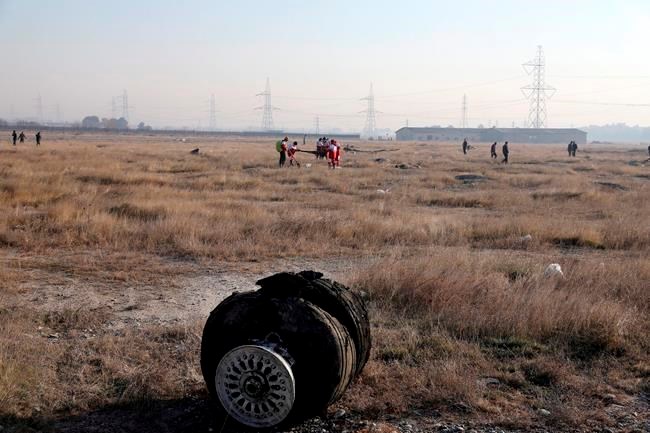OTTAWA — Families and loved ones of those killed in the shootdown of a passenger jet over Tehran are urging Canada to impose so-called Magnitsky sanctions that would target those directly responsible.
Alise Mills, a spokeswoman for the families, says the sanctions regime, named after Russian whistleblower Sergei Magnitsky, would permit Ottawa to freeze the assets and impose travel restrictions on individual Iranians involved.
She said they have been pushing the Liberal government hard for the sanctions in private meetings, but they have met with resistance.
“We’ve come to a point where we don’t understand why this prime minister and his cabinet will not throw down the Magnitsky Act," Mills said Monday in an interview.
There were 176 people killed when the Iranian military shot down Ukraine International Airlines Flight PS752 on Jan. 8, shortly after it took off from Tehran.
That included 55 Canadian citizens, 30 permanent residents and dozens of others with connections to Canada.
Iran initially denied responsibility for the incident but was forced to admit its role after video footage on social media appeared to show at least one missile striking the jet.
Under international civil aviation law, the Iranian government leads the investigation and controls the contents of the plane’s flight recorders. The data was downloaded in Paris in July.
But Canada, Britain, Ukraine, Afghanistan and Sweden, the countries that lost citizens when the plane was destroyed, found Iran's disclosure to be lacking.
Foreign Affairs Minister Francois-Philippe Champagne said he isn’t expecting Iran to be any more transparent in an upcoming progress report.
“The latest that has been provided was not informative at all. So I am suspicious of what may be coming,” Champagne said in a recent interview.
“You can rest assured that we will be ready with the international co-ordination and response group to ask all the questions that will need to be answered by Iran. And I suspect that these questions won't be answered fully or transparently.”
Champagne has rejected Iran’s July report, which depicted a chain of events where the shootdown could have been avoided.
It said that the Revolutionary Guard's surface-to-air missile battery had been moved and had not been properly reoriented before it targeted the Boeing 737-800.
The report said the people controlling the battery could not communicate with their command centre and that they fired twice on a plane that they misidentified without getting approval from their superiors.
Hamed Esmaeilion, a Toronto-area dentist whose wife and nine-year-old daughter were killed in the crash, says he does not believe Iran's explanation either.
“It was not an accident. It was a murder," Esmaeilion said in an interview Monday.
"It's not an air crash, or a plane crash. They murdered 176 people, and we should be completely frank.”
Esmaeilion, Champagne, Transport Minister Marc Garneau and the government's special envoy to the crisis, ex-cabinet minister Ralph Goodale, took part in a solemn ceremony on Parliament Hill flanked by about two dozen people who had lost loved ones in the shootdown.
They observed a moment of silence amid the din of drills and jackhammers that were part of the renovation of the Hill's Centre Block.
"I met these people, shortly after the downing of PS752," Champagne said afterwards.
"Every time we meet, it reminds me and all of us about the work that we still need to do to provide justice, accountability and transparency."
The vigil was one of nine held in cities across North America and Europe to commemorate those killed in the attack, in a renewed effort to press for justice.
This report by The Canadian Press was first published Oct. 5, 2020.
Mike Blanchfield, The Canadian Press



